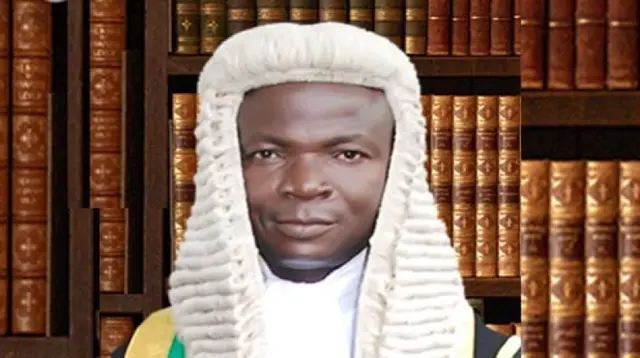
The Federal High Court (FHC) has firmly dismissed reports of an assassination attempt on Justice James Omotosho, who recently delivered the life sentence against Indigenous People of Biafra (IPOB) leader Mazi Nnamdi Kanu.
Reports, circulated by a blogger on social media early Saturday morning, alleged that Justice Omotosho survived an assassination attempt just days after handing down the severe sentence and was rushed to a hospital while security forces scrambled to secure the area.
Reacting to the report, the Chief Registrar of the FHC, Sulaiman Hassan, issued a statement on Sunday morning, November 23 titled, “Rebuttal to False Publication by ‘Celebrity Blogger’ on the Alleged Assassination Attempt on Justice James Omotosho of the Federal High Court.”
Hassan declared the reports to be completely false and unfounded. He stated: “We hereby firmly and unequivocally declare that the said report is completely false and unfounded. The public is advised to treat this publication as fake news and refrain from further dissemination to prevent the spread of misinformation.”
Given the gravity of the publication, which he noted has the potential to cause panic and undermine confidence in the judicial system and could possibly be intended as a form of intimidation—Hassan called on relevant security agencies and regulatory authorities to launch a thorough investigation.
The goal of the probe, he explained, is to “identify and apprehend the perpetrators responsible for this false report and prosecute them in accordance with the laws of the Federal Republic of Nigeria, particularly those relating to cybercrime, defamation, and public misinformation.”
The false report surfaced shortly after Justice Omotosho’s landmark ruling on Thursday, in which he commuted the death sentence of IPOB leader Nnamdi Kanu to life imprisonment after finding him guilty of seven terrorism-related offenses.
The judge sentenced Kanu to life imprisonment on five terrorism counts (one, two, four, five, and six), which each carried a potential death sentence. For the offense of belonging to a proscribed terrorist group (count three), Kanu received 20 years, and for the unlawful importation of a radio transmitter (count seven), he received five years.
The judge showed mercy by ordering the lesser sentences—counts three and seven to run concurrently. Justice Omotosho noted that while the law permitted the death sentence for the terrorism offenses, he, as a Christian, chose to be merciful to the defendant, citing scripture.
He ordered that the IPOB leader be held in a protective custody in any part of the country, excluding the Kuje Correctional Centre in Abuja. The judge also restricted Kanu from using digital devices while in custody without the close monitoring of the Office of the National Security Adviser, citing the defendant’s “unruly behaviours” and lack of remorse throughout the trial.



